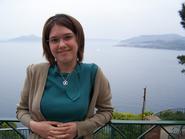
For Casey Green '09, the path to her summer research project began with two Hamilton courses. As a double major in classical languages and history, Green was taking a class on the American founding era and another on Virgil's Aeneid. Both courses discussed the ideal of a republican mother, and Green was interested by how close those ideals were. "I instantly saw a connection," she says.
This summer, Green will collaborate with Professor of Classics Barbara Gold to conduct a comparative study of republican mothers in ancient Rome and early America, funded by an Emerson Foundation grant. She is beginning by researching American mothers, looking at diaries, documents from post-Revolutionary female academies and speeches. She will then go on to research Roman motherhood, and will finish her project by comparing the two paradigms.
In Rome and early America, women were expected to be the moral centers of their households. Ideal motherhood required educated women, who could rear their children to be ethical, active members of society. Raising virtuous citizens was important to the two republics, whose structure depended on public participation in government.
Green has some background in the American side of her project, having studied republican motherhood for a senior paper in high school. She says that in fact, American sources often refer to Roman women as a standard of motherhood, consciously using them as a model to emulate. "I'll see if that is a twisted view or not when I look at the Roman documents themselves," she says.
The Roman section of her research will be more difficult, Green expects, since her background in that area is not as extensive. In addition, she hopes to read many of her source documents in the original, to avoid losing accuracy by using translations. Reading in the original adds a level of difficulty, however.
Here she points to Gold, her advisor, as a crucial resource. One of Gold's areas of interest is women in antiquity, and she recently published an article on Roman mothers. She is helping Green by suggesting useful sources and being available to discuss them, and will also help Green to make sure her Latin translations are accurate.
For Green, the chance to combine her interests in classics and American history was a perfect opportunity. "It was great to find the link," she says. "I am taking my interests in both fields and really tying them together." A member of the Classics Club and vice-president of Eta Sigma Phi, the classics honor society, she is also co-captain of Mock Trial, a member of the Hamilton Tae Kwon Do Club, and active in reading proposals for the Kirkland Endowment. After Hamilton, she plans to attend graduate school studying early American history. She hopes to incorporate her research this summer into a senior thesis. Which one? "I'm not sure yet," she says.
Green is one of 17 students who received funding the Emerson Foundation Grant program, which provides students with significant opportunities to work collaboratively with faculty members, researching an area of interest. The students will make public presentations of their research throughout the academic year.
-- by Laura Bramley
This summer, Green will collaborate with Professor of Classics Barbara Gold to conduct a comparative study of republican mothers in ancient Rome and early America, funded by an Emerson Foundation grant. She is beginning by researching American mothers, looking at diaries, documents from post-Revolutionary female academies and speeches. She will then go on to research Roman motherhood, and will finish her project by comparing the two paradigms.
In Rome and early America, women were expected to be the moral centers of their households. Ideal motherhood required educated women, who could rear their children to be ethical, active members of society. Raising virtuous citizens was important to the two republics, whose structure depended on public participation in government.
Green has some background in the American side of her project, having studied republican motherhood for a senior paper in high school. She says that in fact, American sources often refer to Roman women as a standard of motherhood, consciously using them as a model to emulate. "I'll see if that is a twisted view or not when I look at the Roman documents themselves," she says.
The Roman section of her research will be more difficult, Green expects, since her background in that area is not as extensive. In addition, she hopes to read many of her source documents in the original, to avoid losing accuracy by using translations. Reading in the original adds a level of difficulty, however.
Here she points to Gold, her advisor, as a crucial resource. One of Gold's areas of interest is women in antiquity, and she recently published an article on Roman mothers. She is helping Green by suggesting useful sources and being available to discuss them, and will also help Green to make sure her Latin translations are accurate.
For Green, the chance to combine her interests in classics and American history was a perfect opportunity. "It was great to find the link," she says. "I am taking my interests in both fields and really tying them together." A member of the Classics Club and vice-president of Eta Sigma Phi, the classics honor society, she is also co-captain of Mock Trial, a member of the Hamilton Tae Kwon Do Club, and active in reading proposals for the Kirkland Endowment. After Hamilton, she plans to attend graduate school studying early American history. She hopes to incorporate her research this summer into a senior thesis. Which one? "I'm not sure yet," she says.
Green is one of 17 students who received funding the Emerson Foundation Grant program, which provides students with significant opportunities to work collaboratively with faculty members, researching an area of interest. The students will make public presentations of their research throughout the academic year.
-- by Laura Bramley
